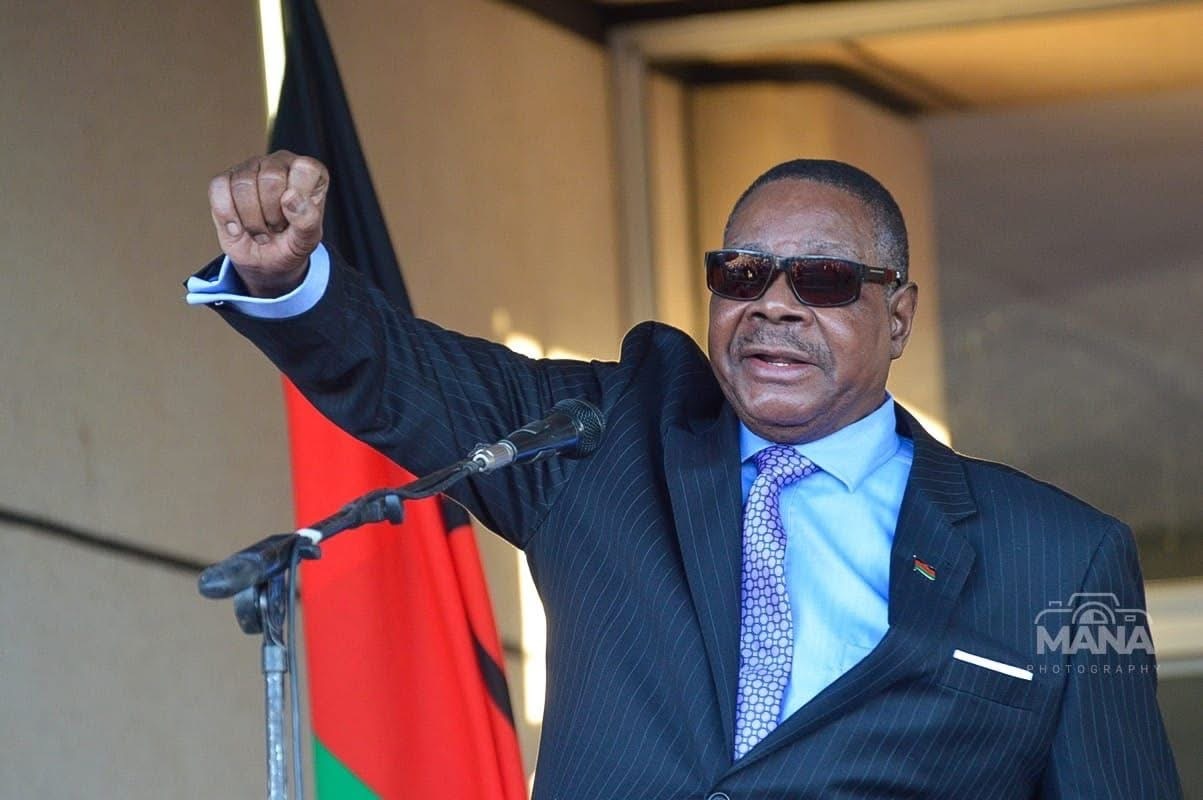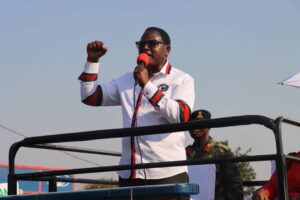
* It is a dramatic reversal of fortune because Mutharika, not only reclaimed power from Lazarus Chakwera but also set a political record of twice defeating incumbents, a wave blowing across Africa in recent years
* Pre-election surveys by the Institute of Public Opinion and Research (IPOR) consistently showed Mutharika ahead of Chakwera
* In the initial opinion survey, he polled 43 percent compared to Chakweras 26% — a 17-point lead that, while narrowing slightly in subsequent polls, remained substantial
By Wanangwa Tembo, MANA
When Prof. Arthur Peter Mutharika announced his comeback to the political stage to be the Democratic Progressive Party torchbearer in the September 16 General Elections, not many people expected the Professor of Law to rewrite the script so decisively.

Advertisement
Five years after being voted out in 2020, the former president has returned as Head of State, clinching a clear victory even when opinion polls signaled the inevitability of a runoff.
It is a dramatic reversal of fortune because Mutharika, not only reclaimed power from Lazarus Chakwera of the Malawi Congress Party (MCP), but also set a political record of twice defeating incumbents, a wave blowing across Africa in recent years.
Pre-election surveys by the Institute of Public Opinion and Research (IPOR) consistently showed Mutharika ahead of Chakwera.
In the initial opinion survey, he polled 43 percent compared to Chakweras 26 percent — a 17-point lead that, while narrowing slightly in subsequent polls, remained substantial.
Analysts also predicted a runoff, arguing that no candidate would reach the 50%+1 one vote threshold without meaningful alliances. Yet when ballots were counted, the narrative shifted — of the 7.2 million registered voters, about 5,502,982 turned up at polling stations and Mutharika secured 3,035.249 votes representing 56.8% of total valid votes cast — surpassing the 50%+1 threshold outright.


On the other hand, Chakwera got 1,765,170 votes, representing 33.0% of the total valid votes cast and for many ordinary Malawians, like Steve Banda — a second-hand clothes vendor in Kasungu District — the results largely reflect accumulated frustrations under the MCP administration.
“I am not surprised,” Banda told Malawi News Agency (MANA). “Life had become so unbearable at the hands of the MCP and people wanted change. Even in parliamentary elections, for example, MCP only managed five seats out of 11 constituencies in Kasungu and only four out of 10 in Dowa, yet these are MCPs strongholds — that says a lot.”
Mutharika’s victory is also steeped in irony because just five years earlier, he was ousted in what many hailed as a democratic breakthrough after the Constitutional Court had annulled the disputed 2019 elections, forcing a fresh poll in 2020.
Riding a wave of discontent that sparked countrywide demonstrations over an alleged mismanagement of elections by the Malawi Electoral Commission (MEC), Chakwera and the MCP-led Tonse Alliance defeated Mutharika in that fresh presidential poll.
At the time, Malawians believed they were turning a page as Chakwera promised a new dawn, pledging to deliver economic transformation, job creation, and integrity in public service — an agenda he branded Hi5.
However, Mutharika had one sentence for Malawians: “you will remember me sooner than later”. True to his word, the entire five years of Chakwera’s regime had been characterised by forex scarcity, fuel queues, inflation, fertilizer shortages — resulting in high cost of living.

Fuel queues

“This time, the burden of incumbency fell on MCP. What once cost Mutharika his presidency now served as the wind beneath his comeback,” said Mike Elioti, a voter in Kasungu District.
In that sense, the 2025 election was less about a groundswell of nostalgia for the DPP than it was a referendum on MCPs record, he says.
Mutharikas earlier presidency (2014—2020) oversaw some infrastructural expansion, including road projects and electricity generation efforts under the Malawi Rural Electrification Programme.
His government also pushed digital reforms such as the Citizen Identity Registration exercise, seen as a milestone in modern governance. However, critics accused the administration of being aloof and slow to act in times of crisis, a perception Chakweras team leveraged effectively during the Tonse Alliance campaign.
In the past five years, allegations of corruption and nepotism had weakened people’s trust while economically, the country struggled with persistent forex shortages, erratic fuel supply, and rising inflation, casting a long shadow over perceptions of accountability and the MCPs capacity to continue ruling.

Despite joining the campaign late — three weeks after the official campaign period began — Mutharika’s strategy was strikingly disciplined. He avoided the exhausting nationwide tours that Chakwera undertook, and opted for fewer but highly symbolic rallies in strategic areas.
His message rarely wavered — the economy is in crisis, life is unbearable, and only his leadership can restore stability: “You made a mistake to vote me out in 2020, but I have forgiven you,” he told a cheering crowd in Ntcheu. “I accepted to come back so that I can rescue this country from the economic problems we are experiencing under the MCP.”
At rallies in Mulanje and Katoto in Mzuzu City, he repeated the message that Malawi was in a “rotten state”, crippled by shortages and rising costs and presented himself as the saviour of a nation on the brink of collapse.
Political analyst Wonderful Mkhuche also believes Mutharikas victory is more about public dissatisfaction with Chakwera, saying: “I’m not surprised because looking at surveys done by institutions like IPOR, they predicted that Mutharika would lead the race.
“So the results are simply confirming what was already concluded by those surveys. Mostly, the vote the DPP has gotten is a protest vote. People voted for the DPP because MCP failed to fulfill what they promised.”

Advertisement
Mkhuche, however, warned that the DPP must not take its victory and the voters for granted, saying the votes have been given on condition that the party acts better than the MCP.
“The DPP we have today is the same that was voted out of power in June 2020. The challenge they have today is that they should reform themselves and identify people they can work with, in order to fulfill whatever, they have promised.
“For the MCP, they led an economy that wasnt responding to peoples needs. We could see that there was no fertilizer, sometimes no sugar, no fuel, increasing prices of goods and services; everything was not going well for the economy and people felt they should go for another party with an expectation that it will act better,” he said.
Promise of renewal
Among other things, the DPP Manifesto promises increased Constituency Development Fund to at least K5 billion per constituency every year, K200 million for women and youth businesses and free secondary education.
Additionally, the manifesto promises houses for civil servants, rebuilding the economy, ending energy problems and ending extravagance by appointing a lean cabinet and reducing funding for State Residences.
Such promises, though familiar in Malawian politics, were packaged as a new deal — a chance for voters to reset after five turbulent years. And interestingly, despite persistent attacks on his age, Mutharika managed to command significant youth support.

Advertisement
IPOR surveys suggested that about half of youthful voters leaned toward him, an extraordinary figure given that more than 60% of Malawis population is under 35.
Across Africa, these cases reflect a volatile electorate that is quick to punish failure, willing to recycle old leaders, and increasingly insistent that performance, not rhetoric, defines legitimacy.
From a crowded ballot of 17 candidates, voters managed to locate the DPP leader, hoping for a better life. His return to State House is undeniably historic, but it comes with a heavy burden of expectations because for many voters like Steve Banda in Kasungu, patience may be thin.
“People just wanted change and we will be happy if the change we have voted for, translates into real relief at household level,” he says.
When the promises are fulfilled, Mutharika’s second coming to presidency will be remembered as a final vindication of the need to “return to proven leadership”, the DPPs campaign slogan.
For now, though, Mutharika re-enters Kamuzu Palace as a comeback hero — granted a rare second chance after a five-year hiatus. As he begins another five-year mandate, the stakes are high, celebrations loud, but the demand for delivery will be louder still — as he has inherited a deeply strained economy and a restless citizenry demanding quick results.



Advertisement
